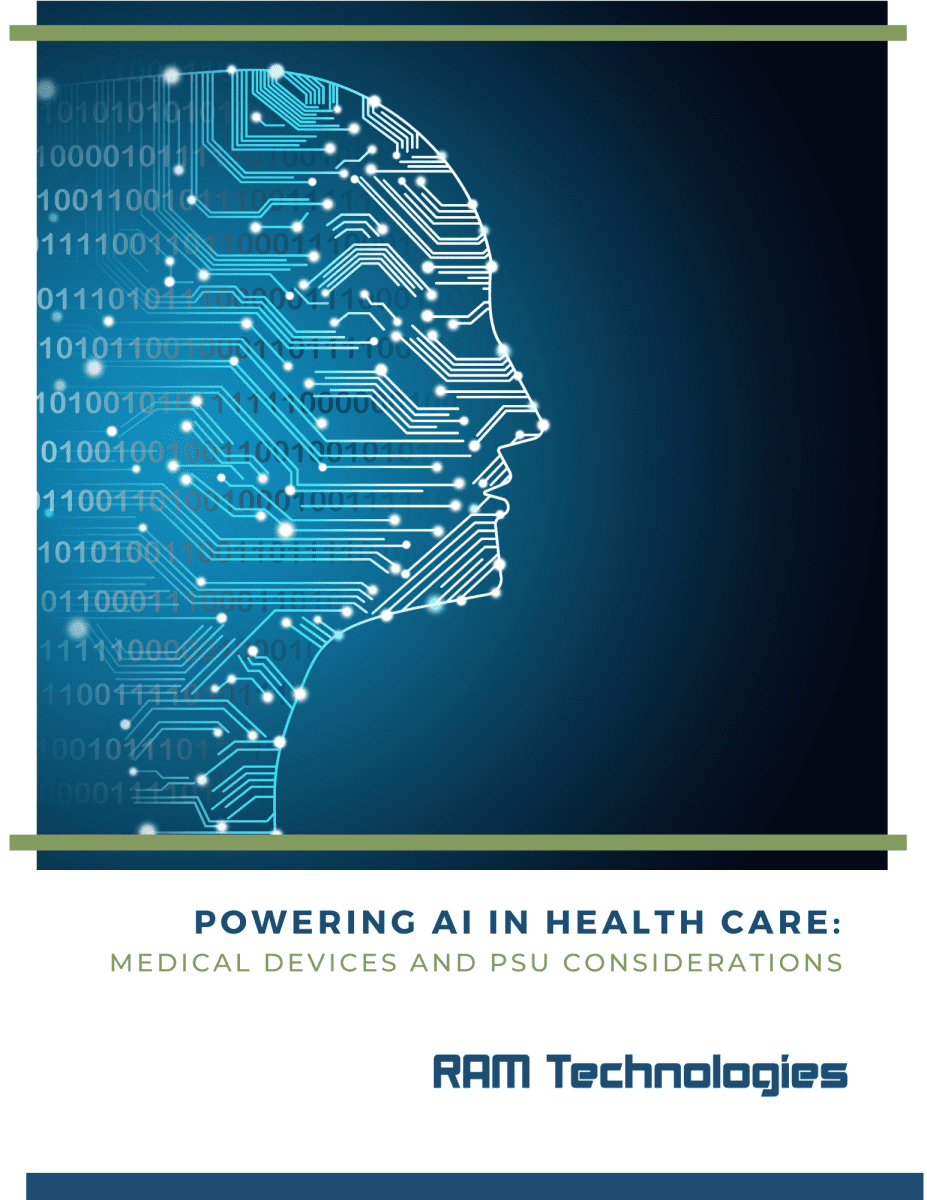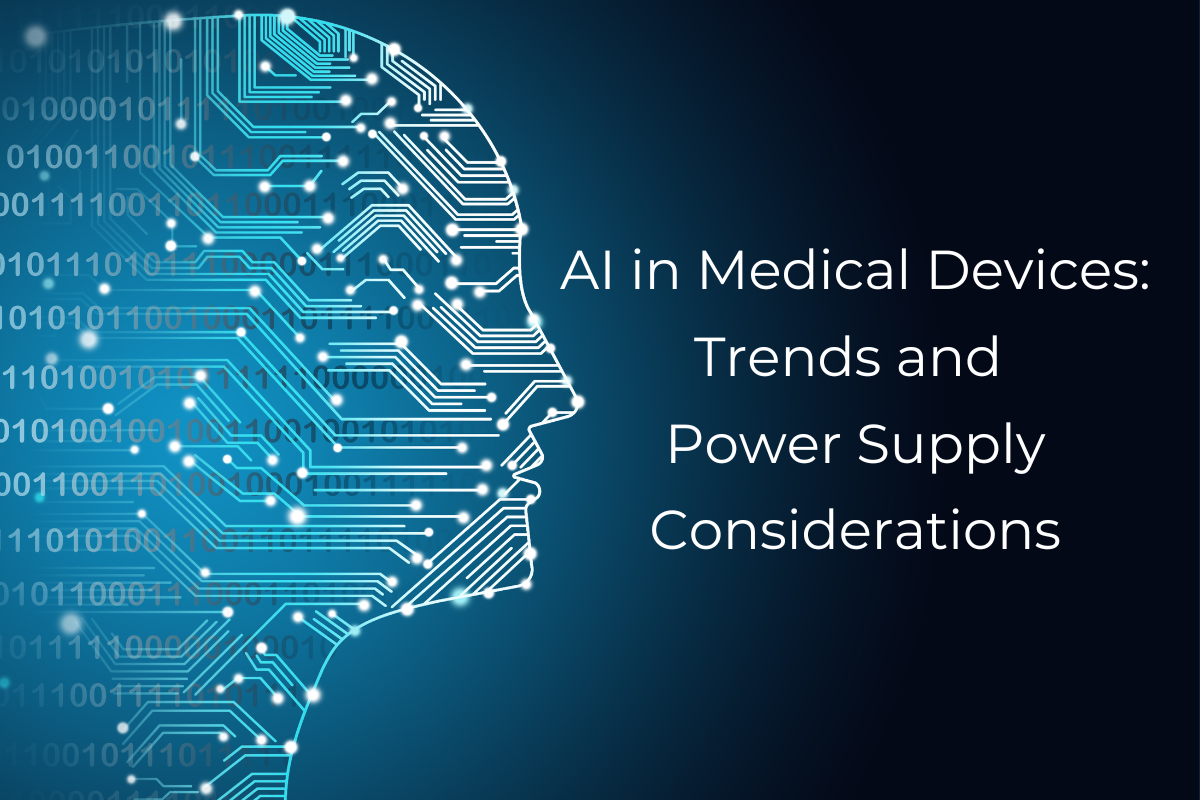Artificial intelligence and machine learning (AI/ML) are changing the medical device landscape with promises of more effective treatments, improved patient outcomes, and faster diagnoses. However, the potential of this new technology also calls for a greater need for reliable power supplies to keep medical devices running safely and effectively. In this blog, we’ll cover some emerging technologies and trends aided by AI that are impacting the medical device world. We’ll also discuss what medical device manufacturers should consider when choosing a power supply to support these emerging technologies.
Real-Time Imaging
Real-time medical imaging can use AI to analyze images in a few different ways. This includes image segmentation, which can identify objects within an image, as well as image analysis that can identify patterns and anomalies. Artificial intelligence can also fill in missing data through image reconstruction or provide guidance for procedures. With AI-powered real-time imaging, patients can receive earlier diagnoses with improved accuracy, often at reduced costs.
The use of real-time imaging has been applied to fluoroscopy, ultrasound, MRI, and more. However, implementing this technology can be challenging. Training AI algorithms require massive datasets, and clinicians need to be mindful of patient privacy. It can also be difficult to gain regulatory approval with AI-enabled devices if manufacturers can’t effectively explain how AI algorithms make decisions.
Powering these devices appropriately is a vital part of their effectiveness. High-performance, medical-grade power supplies are necessary for real-time imaging that doesn’t experience downtime or outages that can impede insights.
Gaining FDA Approval for AI in Medical Devices
Currently, there’s no specific pathway for FDA approval of AI/ML devices. Manufacturers are using existing pathways such as 510(k), which compares new devices to those that have already been approved. However, this isn’t appropriate in all cases, since AI/ML technology can be very different from the older devices they’re trying to compare to, some of which may have a 20-year gap or more.
A research paper published in The Lancet in 2023 recommended that the FDA focus more on the unique characteristics of AI/ML devices when approving them, and that the FDA improve the 510(k) pathway to ensure new devices that use artificial intelligence and machine learning are safe and effective.
Trends With FDA Approval For AI in Medical Devices
Currently, medical devices that have received FDA approval and contain AI/ML technology tend to share similar functions and serve similar purposes. Radiology is a popular area for AI/ML devices, with real-time imaging being a key function for these devices. This includes the Brainomix 360 Triage ICH for stroke detection. However, complexity of the approved devices vary, with some more simple and others applying deep learning models.
While large language models (LLMs) are not yet used in approved medical devices, the future likely holds more AI/ML devices in radiology, with potentially more complex models being used. The highest year-over-year increase in AI/ML devices was in 2020.
Predictive Analytics
Predictive analytics uses AI to analyze vast amounts of data and identify patterns that may not be obvious to humans. The findings can be used to predict equipment maintenance needs or shine a light on potential patient issues.
For example, artificial intelligence can be used with defibrillators to improve the accuracy of shock delivery or with continuous glucose monitors to personalize insulin therapy for diabetics. It can also be used to avoid major equipment breakdown by identifying opportunities for preventative maintenance.
Generative AI
The average person may be used to encountering generative AI and large language models (LLMs) in their everyday lives or at their respective workplaces, but the use of these technologies in medical devices is still under development. Generative AI creates new content based on existing data, whereas LLMs process and generate human-like text.
There are some promising use cases for generative AI in medical devices, such as summarizing patient visits or creating personalized care plans or even implants. However, training LLMs for medical applications requires a lot of patient data, which raises concerns about privacy and bias in AI models.
Edge Computing
Another technological area likely familiar to most is the Internet of Things (IoT), a market of devices that require real-time processing of generated data to function effectively. This includes wearable devices, such as smartwatches, as well as smart home devices like lights and locks.
The Internet of Medical Things (IoMT) market is expected to grow significantly, with devices generating large amounts of data that require real-time processing. Edge computing processes data closer to the devices, which can reduce latency and improve performance.
Anything that transmits data to the cloud could be an example of an IoMT device, such as a wearable health tracker, smart pill, or other remote monitor. By enabling real-time data analysis, edge computing can improve the patient experience. It can also improve data security by processing data in a decentralized manner.
Edge computing is being used in medical devices with telemedicine, AI-powered diagnostics, and remote patient monitoring to achieve faster diagnoses and foster proactive interventions.
RAM Technologies’ power supplies are 60601-1 3.2 certified. When you’re designing your medical device and need help with a PSU, contact us for details.

Download the AI/ML Summary
Artificial Intelligence and Machine Learning (AI/ML) are changing the medical device landscape. Get a summary of the latest trends and where we think AI/ML can go with medical devices by downloading our guide.
More Resources:
Trends in FDA-Authorized AI/ML Devices
Predictive Analytics in Health Care and PSU Considerations
Generative AI in Medical Devices: What Does the Future Hold?



